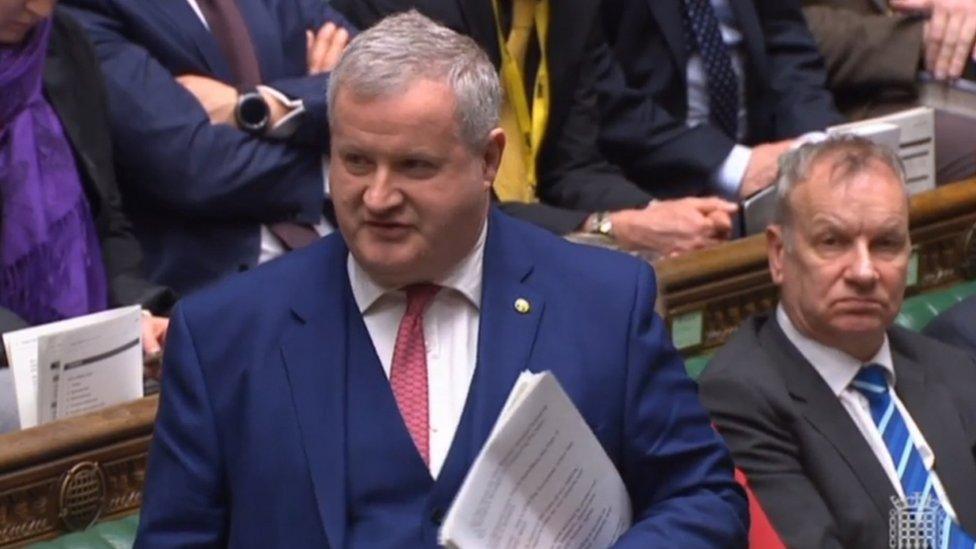Losing more than her voice
- Published
Theresa May says MPs "should hear Jean-Claude Juncker's voice"
The last time the prime minister's voice was this throaty, she was handed a P45. Could it happen again? If - when? - she loses tonight's meaningful vote in the Commons.
We knew that the EU negotiations had been tough. We knew they had been protracted, including the last ditch chat with EU leaders.
Today we had the audible evidence. The PM's voice was croaky, subdued and evidently sub-optimal.
You may recall that previous occasion. Conservative Party conference in 2017? Theresa May's voice was comparably afflicted. Letters fell off the set behind her. And a demonstrator thrust that P45 into her endlessly polite grasp.
As then, there was empathy all round today. Jeremy Corbyn, Ian Blackford, backbenchers of all colours wished her a speedy recovery. The Chancellor surreptitiously passed her throat pastilles. They were gratefully received.
But the house can be simultaneously kind and cruel. You could almost sense members wondering whether Theresa May's term in office might be nearing the end.
Indeed, there were one or two oblique references to that prospect. Remarks to the effect that today's debate was as much about the PM's future as Brexit.
However, the PM battled on gamely. Indeed, she responded to one anxious inquiry about her voice by noting wryly: "You should hear Jean Claude Juncker!" Her interlocutor in last night's talks in Strasbourg.
Attorney General Geoffrey Cox: "Let me make it clear. The legal risk... remains unchanged"
But, just as with that reflection on laryngitis past, there was a decided touch of déja vu about today's discourse. The speeches were eerily familiar. The arguments repetitive.
And the prospect of a government defeat still in the air, especially as the DUP and the more zealous Tory Brexiteers say they remain unconvinced. Defeat, one presumes, by a lower margin than last time out, when the majority was 230 against the Treasury bench.
The one exception to this sense of Groundhog Day was Geoffrey Cox, the attorney general, who acted as warm-up act to the PM. He said that his legal advice had changed as a result of the last ditch talks. There were "materially new legal obligations" upon the EU, most notably from the tight timetable now placed upon the future trade negotiations.
It was, as ever from the attorney general, a performance suffused with bravado. But he could not, he would not, seek to obfuscate entirely the point that his fundamental advice remained, substantially, unchanged.
The UK could not unilaterally abandon the Northern Ireland backstop in any and all circumstances. Yes, there were now more grounds available for suspending the backstop, based upon an accusation of bad faith against the EU. That could now be tested against the timetable.
But the UK could not - without agreement - withdraw from the backstop, unless key and exceptional circumstances arose.
Mr Cox however concluded - in a big concession for a QC - that the law was not everything. There were legal risks associated with everything - and one could take practical steps to remedy them.
This was, ultimately, a political decision. On all sides, MPs thanked him. They praised his sagacity. They praised his integrity.
And they reached for their various views on that political choice. As I write, it is not looking good for the prime minister and her endeavours to win support for her deal.

Ian Blackford said Mrs May's deal was "rotten"
Scotland featured sporadically - but substantially - in the exchanges. Just before the PM's statement, around the time that Geoffrey Cox was seeking to cajole, the Scottish cabinet met in Edinburgh.
Nicola Sturgeon updated colleagues on Brexit, restating the Scottish government's conclusion that there is no such thing as a "good" Brexit. Every version, every option would be worse than remaining in the EU.
Naturally, that verdict was reflected in the speech by Ian Blackford, the SNP's Westminster leader. The PM, he said, had tendered a "rotten deal" which had not changed one whit as a result of the prime minister's coughing competition with Mr Juncker.
Mr Blackford began in lyrical form, talking of Scotland's historic links with Europe. But he soon got down to the task of the day - warning the PM that her second meaningful vote attempt was doomed.
For his part, the Labour leader said "literally nothing has changed" - once again parodying a line from the PM at the 2017 general election. The PM offered no certainty.
In response, Mrs May said the only certain thing about the Brexit debate was that rejecting her deal would amplify uncertainty.
As I write, if the deal is rejected tonight, the Commons is scheduled to vote in successive days on a no deal Brexit (for or against) and on a deferral of departure (for or against). I stress, as I write.